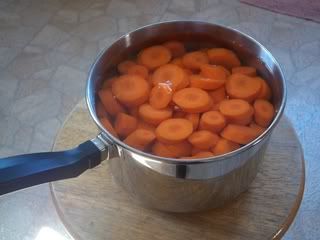
A tip: Want to prep your carrots ahead of time? Peel and cut them and put them in a stainless steel pot covered with cold water. Store them in the fridge until you are ready to cook them. They will stay nice and fresh for at least a day. Depending on how thick you cut them, they boil in around an hour on the stove.
Does it really matter what kind of carrots you buy?
Ultimately, no. But, if you are trying to shave every bit off of your grocery budget, yes, it can make a difference. How big of a difference? Maybe bigger than you think!
Sometimes I struggle with weighing out the cost of convenience and deciding whether or not paying a little bit extra is worth it. Buying baby carrots is one of those tempting shortcuts. They are ready-to-eat raw, and if I want to steam them, they don't require any prep, I just dump them in a pot and cover them with water. They are instant, healthy food. Baby carrots are a wonderful invention!
(Read the story of how baby carrots were invented here. It's fascinating! Carrots that were once culled and worthless are now processed into a product that is in high demand and is worth more to consumers.)
I decided to do some math to determine how much I would really save if I bought the large, whole carrots and peeled and cut them myself. Here is the rundown based upon my local grocery store prices:
| Type of Carrots | Cost | Cost/lb | Cost of Convenience | Wages Earned |
| 5 lb. bag large, whole carrots | $3.00 | $.60/lb | 0 | 0 |
| 1 lb baby carrots - SALE price | $1.00 | $1.00/lb | $.40/lb | $4.80/hr |
| 1 lb. baby carrots - regular price | $1.50 | $1.50/lb | $.90/lb | $10.80/hr |
| 1 lb. organic baby carrots | $2.20 | $2.20/lb | $1.60/lb | $19.20/hr |
(I'm not comparing the prices of frozen carrots because they were significantly higher in price than fresh, so I learned that I am justified in never buying them.)
Hopefully, the first three columns are self explanatory. The next two might be a bit puzzling if you are not familiar with these concepts already. Let me explain how I did the math and calculated the "Cost of Convenience" and the "Wages Earned".
Cost of Convenience:
I simply calculated the difference between the price per pound for the more expensive ready-to-eat carrots from my base price for the cheapest option - the large, whole carrots. This is the true dollar amount saved.
*Wages Earned:
This is more of a fun calculation and tells me how valuable my time is with a dollar amount. I timed myself and it took me 15 minutes to peel and cut 3 lbs. of carrots. This means I can do 12 pounds in an hour. I multiplied the "cost of convenience" for 1 lb. number by 12 and found how much money I "earn" by saving. Basically, because I spend the time peeling and cutting my own carrots, I am earning the equivalent of $10.80/hr. Not too shabby! I feel a lot more motivated to put in the work when I know that the work has real value.
(*This type of calculation is further explained in "The Complete Tightwad Gazette" by Amy Dacyczyn on page 103.)
Now... are there times when I will buy baby carrots? Yes.
When we are in crisis mode and they are on sale, I consider it a wise purchase. When we are traveling and purchasing food on the road, they are worth the price of convenience. They are healthy and the Littles love them and I MUCH prefer them to junk food when we need a snack to nibble on during a car trip.
Am I trying to make you feel guilty because you buy baby carrots? NO!!!!
Please don't feel guilty! If you simply enjoy baby carrots, or if you are much more likely to reach into the fridge to eat them than the ones you have to peel and cut yourself, then buy them. This is just a useful exercise for someone that is really serious about cutting down their grocery budget and is motivated to nickel and dime their way out of debt and I am one of those people.
Every little bit counts!!
Remember, you can use this technique to evaluate prices on anything! Check out the cost per pound for pre-bagged salad vs. heads of lettuce that you wash and tear yourself if you want some motivation to make your own salads. And don't take my word for it! As Dawn said in the comments, prices in her area are different, and might mean different choices. There is power in knowing your prices!
This post is a part of the Four Moms linkup on keeping your food budget down as prices rise.

We're lucky in that organic carrots and regular carrots aren't too big a difference in price. Organic, whole carrots are $1.50/lb. and regular whole carrots for around $1/lb. I buy both types, but I sometimes opt for the baby carrots, as well. My kids like to eat carrots, and they are one snack I definitely don't feel guilty about eating!
ReplyDelete